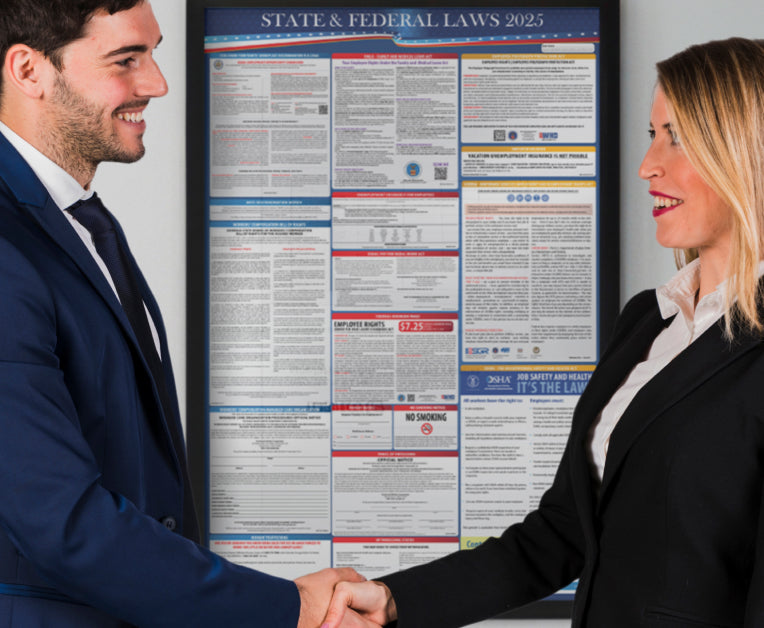
Labor Law Poster Compliance for Leasing Offices and Apartment Complexes: Essential Guidelines
Leasing offices and apartment complexes are unique work environments where staff handle leasing, maintenance, tenant relations, and administrative tasks. In these settings, labor law compliance is essential, yet it is often overlooked amid daily operational priorities.
Labor law posters are more than just a legal formality—they are an essential HR tool. They ensure employees understand their rights, maintain workplace transparency, and protect property management teams from potential fines or legal disputes.
This comprehensive guide details why labor law posters are critical for leasing offices and apartment complexes, how to display them effectively, accessibility considerations, keeping them updated, and strategies for maintaining compliance across multiple properties.
Why Labor Law Posters Are Critical in Leasing Offices and Apartment Complexes
Staff in leasing offices and apartment complexes can include property managers, leasing agents, maintenance personnel, and administrative support. Each role carries federal and state labor rights, which must be communicated clearly through labor law posters.

Key areas covered by posters include:
- Minimum wage and overtime laws
- Workplace safety standards (OSHA compliance)
- Anti-discrimination and equal employment opportunity protections
- Family and medical leave entitlements
Properly displayed posters protect employees, reduce liability, and foster a professional workplace culture. For guidance on compliance in related real estate environments, see: Labor Law Poster Compliance for Real Estate Brokerages: HR Essentials and Labor Law Poster Compliance for Marketing and Advertising Agencies: Essential Guidelines.
Understanding Labor Law Poster Requirements
Federal Requirements
All leasing offices and apartment complexes must comply with federal labor posting requirements, including:
- Fair Labor Standards Act (FLSA): Minimum wage, overtime, and child labor protections
- Occupational Safety and Health Act (OSHA): Ensures workplace safety and incident reporting
- Family and Medical Leave Act (FMLA): Provides job-protected leave
- Equal Employment Opportunity (EEO): Protects against workplace discrimination
Even small property management offices are required to display these posters to remain compliant.
State-Specific Requirements
States often have additional posting requirements, including:
- California: Workers’ compensation, disability insurance, harassment prevention
- New York: Paid family leave, wage law posters
- Texas: Unemployment benefits, anti-discrimination notices
Property managers operating across multiple states must ensure all locations are compliant with federal and state laws.
Strategic Placement of Posters in Leasing Offices and Apartment Complexes
Proper placement ensures that employees can access and read essential information, even in fast-paced environments.
1. Employee Lounges and Break Rooms
Staff often take breaks or have downtime in staff lounges or kitchen areas. Posting here ensures employees review labor rights during natural downtime.
2. Near Reception or Leasing Counters
High-traffic areas such as reception desks or leasing counters maximize visibility for both full-time and part-time staff.
3. Administrative and HR Offices
For offices using time-tracking or payroll systems, posters should be placed in or near HR or administrative areas, ensuring employees regularly encounter these resources.
4. Multi-Property Management
For property management companies overseeing multiple apartment complexes, consistent posting across all sites is critical. Digital versions can supplement but cannot replace physical posters.
Accessibility Considerations
Leasing offices often employ a diverse team, including multilingual and differently-abled employees. Accessibility ensures all staff understand their rights:
- Eye-Level Placement: Posters should be 57–60 inches from the floor for optimal visibility
- Multilingual Versions: Provide translations for employees who speak different languages
- ADA Compliance: Include Braille, large-print, or digital formats
Accessible posters help minimize misunderstandings and maintain compliance with federal and state laws.
Keeping Labor Law Posters Updated
Labor laws are subject to frequent changes, and keeping posters current is essential for compliance.
Assign a Compliance Officer
Designate a staff member or property manager to monitor labor law updates and implement them promptly.
Automated Poster Services
Subscription-based services can automatically deliver updated posters to multiple properties, ensuring compliance and reducing administrative burden.
Review Schedule
- Federal Updates: Check annually or when the Department of Labor releases notifications
- State Updates: Monitor state labor department announcements
- Immediate Implementation: Apply changes as soon as laws are updated
Common Compliance Challenges in Leasing Offices
Leasing offices and apartment complexes face unique challenges:
- High Staff Turnover: Seasonal or part-time leasing agents increase the need for accessible posters
- Multiple Locations: Ensuring consistent compliance across multiple properties
- Digital vs. Physical Confusion: Relying solely on digital posters is insufficient
- Contracted Staff: Maintenance personnel or third-party contractors may not see posters regularly
Addressing these challenges requires consistent policies, audits, and employee education.
Legal and Financial Risks of Non-Compliance
Ignoring poster requirements can expose leasing offices to:
1. Fines and Penalties
Federal and state agencies can impose fines for missing, outdated, or improperly displayed posters, which can escalate across multiple properties.
2. Employee Complaints
Employees may file complaints if posters are not visible, leading to:
- Investigations
- Legal disputes or settlements
- Administrative costs and operational interruptions
3. HR and Operational Burden
Non-compliance increases administrative workload, detracting from property management and tenant services.
4. Reputation Risk
Leasing offices rely on professional reputations. Non-compliance can erode trust among staff and tenants, affecting retention and community perception.
Best Practices for Leasing Offices and Apartment Complexes
- Centralize Compliance Responsibility: Assign a compliance officer for all properties
- Automate Updates: Use subscription services to deliver updated posters
- Educate Employees: Ensure staff know poster locations and their purpose
- Ensure Accessibility: Provide multilingual, Braille, and large-print posters
- Conduct Regular Audits: Check quarterly or semi-annually to ensure posters are current and visible
Implementing these best practices reduces risk, fosters transparency, and supports professional management operations.
Best Practices for Leasing Offices and Apartment Complexes
- Centralize Compliance Responsibility: Assign a compliance officer for all properties
- Automate Updates: Use subscription services to deliver updated posters
- Educate Employees: Ensure staff know poster locations and their purpose
- Ensure Accessibility: Provide multilingual, Braille, and large-print posters
- Conduct Regular Audits: Check quarterly or semi-annually to ensure posters are current and visible
Implementing these best practices reduces risk, fosters transparency, and supports professional management operations.
Compliance as a Cornerstone of Property Management

Proper labor law poster compliance reflects a commitment to:
- Employee rights and workplace safety
- Ethical and professional property management practices
- Reduced legal and financial risk
- Operational efficiency and strong reputation
Embedding compliance into daily operations ensures leasing offices function smoothly while safeguarding employees and tenants.
Labor law posters are essential for leasing offices and apartment complexes, regardless of property size or number of locations. Correct placement, accessibility, and timely updates protect employees, maintain compliance, and reinforce professionalism.
Proactive strategies—centralizing responsibility, automating updates, conducting audits, and ensuring accessibility—allow property managers to avoid fines, legal disputes, and operational disruptions.
Ultimately, labor law posters are more than a legal requirement—they are the foundation of a safe, transparent, and professionally managed leasing office or apartment complex.


